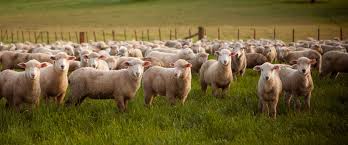Sheep love the Internet
September 2015
The internet has had many unexpected consequences, as inventions do. For example, it was ages until I realised just how useful texting from mobile phones is for deaf people, and similarly, the Kindle has often allowed those with poor sight to re-discover reading. I bet neither group was considered when the inventions were conceived.
Equally, for all his genius, I doubt that Sir Tim Berners-Lee gave much thought to sheep when he was developing the World Wide Web; despite that, his work has significantly improved their quality of life. Not because sheep use Facebook (it’s humans that behave like sheep in that context), but because the Web has transformed the selling of sheep to considerable ovine benefit.
I discovered this when talking to an Australian farmer at a recent wedding in the village; his son had just married a local girl. First I had to adjust my perspective to grasp the sheer scale of Australian farming. Most farms in the UK are, I suppose, well under 500 acres; his is about 450,000 acres, roughly the size of Berkshire (“but we’re not one of the big ones”). Then he mentioned in passing that his sheep love the internet.
 It’s all because of online livestock auctions. As recently as ten years ago, the only way for him to sell his sheep was to load them all into trucks (sometimes thousands of sheep at a time) and drive them slowly for hundreds of miles on bad roads to market; by the time they got there, the sheep didn’t look too good, and if prices were too low that day, he was faced with either taking a loss or hauling them all the way back again.
It’s all because of online livestock auctions. As recently as ten years ago, the only way for him to sell his sheep was to load them all into trucks (sometimes thousands of sheep at a time) and drive them slowly for hundreds of miles on bad roads to market; by the time they got there, the sheep didn’t look too good, and if prices were too low that day, he was faced with either taking a loss or hauling them all the way back again.
This was expensive in time and transport, but worse, it was to the considerable detriment of the sheep. They would return from the round trip in worse shape than at the start. So, as well as causing the sheep discomfort the farmer had spent money only to reduce the value of his stock. Even if they did sell, at any price, another long trip was in prospect to their new home.
Happily, this need be no more. The growth of online livestock auctions has greatly improved matters and has even created a new profession: the livestock assessor. Nowadays, a farmer will round up a representative sample of the sheep he wants to sell (perhaps a hundred or so) and an assessor will visit the farm to grade them. There is a cost to this, but it is a fraction of the cost of transporting the whole flock to market. Once this is done, the sheep are entered into an online auction which is open to buyers from all over the country, not just those who turn up at a particular sale room on the day.
If the sheep sell, the buyer arranges to collect what has been bought, so there is only one journey for the animals to suffer. If they don’t sell, they can be entered into a later auction; either way, the sheep themselves have been grazing peacefully while this all goes on, without the stress of long, expensive and unnecessary journeys.
 It’s popular; Anna Speer, CEO of AuctionsPlus.com.au, the largest Australian online auctioneers, told me that last year they sold 34% more cattle and 11% more sheep than the year before. They’ve measured not only better animal welfare during the sale, which is obvious, but also a significant improvement in the condition of animals when they arrive at their new home over traditional methods.
It’s popular; Anna Speer, CEO of AuctionsPlus.com.au, the largest Australian online auctioneers, told me that last year they sold 34% more cattle and 11% more sheep than the year before. They’ve measured not only better animal welfare during the sale, which is obvious, but also a significant improvement in the condition of animals when they arrive at their new home over traditional methods.
Add to that farmers being able reach a much larger group of buyers and you can quickly see why both sheep and farmers love the internet; it wouldn’t be possible any other way.
More information
Click here for auctionsplus website

